
On the threshold of a new era - the era of national development, Resolution 68-NQ/TW of the Politburo on private economic development was born as a turning point, a breakthrough in thinking and planning economic development policies, an affirmation of the Party on the key role, the leading important driving force of the private economic sector in the country's development process with the requirement of strong institutional reform, implementation mechanism, building a transparent, effective business ecosystem, accompanying enterprises.
Immediately after Resolution 68 was issued, the entire political system immediately began implementing it to bring the Party's policies and decisions into practice, in which the National Assembly issued a Resolution on a number of special mechanisms and policies for private economic development; the Government developed specific programs and plans to implement the Central and National Assembly's resolutions on private economic development.
In order for the private economy to truly "take off" and promote its role as "the most important driving force of the national economy", Resolution 68 as well as related Resolutions and directives have put forward very specific and clear viewpoints, goals, roadmaps, tasks and solutions. One of the important tasks and solutions proposed is to diversify capital sources; create the most favorable conditions for the private economy to access capital resources; review, supplement and perfect credit mechanisms and policies for the private economy; focus on removing difficulties and obstacles for the private economic sector;...
Credit capital is considered the "blood vessel" for the economy in general and enterprises in particular, in which commercial banks play a particularly important role in supplying, regulating, and ensuring the circulation and smooth operation of this blood vessel system.
Faced with new requirements and new tasks set forth by Resolution 68 and Resolution 198 of the National Assembly on a number of special mechanisms and policies for private economic development and the directions of the Government and the Prime Minister, how have the banking sector and commercial banks prepared? What solutions are there to diversify capital sources and create the most favorable conditions for the private economy to access loans? What mechanisms and policies related to credit need to continue to be supplemented and improved? What role should commercial banks play in implementing Resolution 68?
All these issues will be analyzed, evaluated, discussed and interpreted at the Seminar. "Promoting the role of commercial banks in implementing Resolution 68" organized by the Government Electronic Information Portal with the participation of leaders of functional agencies, experts, businesses and the accompaniment of Vietnam Joint Stock Commercial Bank for Industry and Trade (VietinBank).
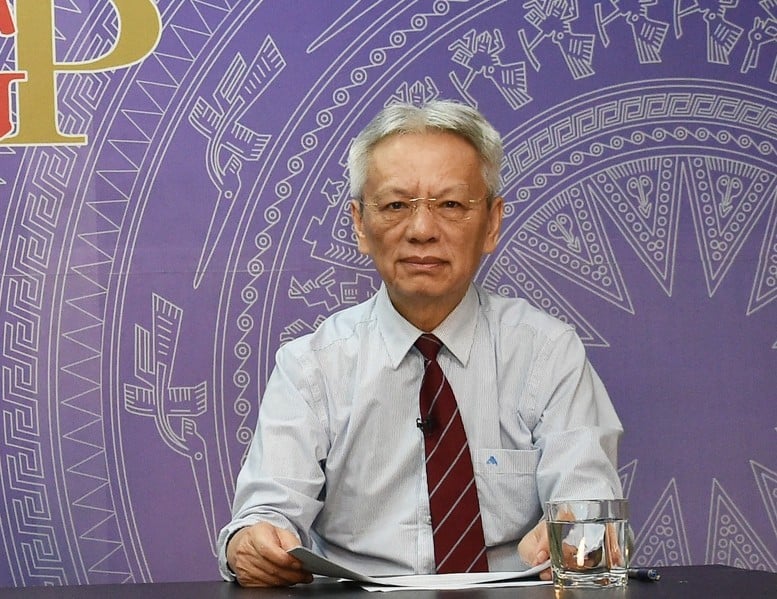
Dr. Nguyen Si Dung: In the new context, when we have Resolution 68 and our country is standing on the threshold of a new era, as a representative of the state management agency in the banking sector, how do you perceive and evaluate the role of capital sources, the current issue of credit supply in meeting the development needs of enterprises and what opportunities will Resolution 68 open for enterprises as well as what requirements and demands will it place on the system of commercial banks and enterprises in implementing and enjoying the policy?
Mr. Nguyen Phi Lan, Director of the Department of Forecasting, Statistics - Monetary and Financial Stability (SBV): Resolution 68 issued by the Politburo has created an important mark for the entire Vietnamese economy in the current period of innovation. The Resolution is enthusiastically awaited by the business community, especially the private economic sector and private enterprises. This is one of the resolutions that has great appeal and creates a great driving force for the entire economy, creating new momentum for the development process in the next stage of our economy.
Resolution 68 has created conditions for the private enterprise sector to access capital, essentially diversifying capital sources, not only capital from the banking sector but also other capital sources.
By June 18, 2025, the total outstanding credit balance of the system reached VND 16.73 million billion, an increase of 7.14% compared to the end of 2024, an increase of 18.71% compared to the same period in 2024 (in the same period in 2024, outstanding credit balance increased by +3.87% compared to December 2023).
Through the statistical process, it is found that up to 100 credit institutions have generated outstanding debt ratios for the private economic sector. And of which, about 209,000 small and medium enterprises have generated outstanding debt at credit institutions, especially commercial banks. That confirms that credit capital has spread to all segments of enterprises, all segments of the economy.
Besides, this figure not only reflects the strong development of the private economic sector but also reflects the efforts and endeavors of the banking industry for the private economic sector.
In recent times, the banking industry has had practical policies to accompany private enterprises such as restructuring debt repayment periods, reducing interest rates, supporting recovery after epidemics and natural disasters, such as the COVID-19 pandemic, typhoon Yagi, etc. Banks have also constantly innovated and diversified credit products, digitized lending processes as well as reduced costs, shortened application procedures in the processing of loans for private enterprises.
The issuance of Resolution 68 poses many opportunities as well as challenges for private enterprises. One of the points we can see most clearly when evaluating Resolution 68 for the private economic sector is that Resolution 68 has encouraged private enterprises to build a transparent financial system and ecosystem. It is necessary to ensure transparency, ensure soundness, and improve governance capacity, especially financial governance capacity for banks, and for small and medium enterprises.
Besides, it creates more systematic investment opportunities for businesses, suitable for the market segment that private businesses are pursuing, and also creates conditions for private businesses to diversify capital sources to minimize risks and avoid over-reliance on capital flows from the banking sector.
In addition, private enterprises have the opportunity to mobilize other sources of capital from domestic and foreign economic sectors. At the same time, they can implement forms related to joint ventures, associations, equitization, implemented through the stock market, issuing bonds and shares. In the context of entering a new era, it requires private enterprises to make efforts to change their appearance. For the banking industry, one of the issues is to accompany the private economic sector. The first companion is that the banking industry must improve risk management, ensure that credit flows are allocated effectively, focusing on priority industries and sectors, sectors that the private economic sector has and is in need of.
The second issue is that the banking industry must innovate technology, apply digital to credit services, and let customers experience better services and products. The process must be simpler. That forces the banking industry to innovate and adapt to current changes.
The banking industry also supports this consulting, helping private enterprises in the process of approaching the market, accessing capital, designing more specialized financial products, so that enterprises feel that these products are useful, effective and interested in those products.
At the same time, the banking industry must implement more stringent procedures, ensuring compliance with international standards and international practices.

Dr. Nguyen Si Dung: The bank has made a huge contribution and is now the private enterprise with the largest credit balance ratio among all economic sectors. So, may I ask you more about the orientation in the coming time?
Mr. Nguyen Phi Lan: As soon as Resolution 68 was issued, the Governor of the State Bank issued action plans No. 2415 and 2416 to implement Resolution 68 as well as to concretize Resolutions 138 and 139 of the Prime Minister. This action plan has concretized all action programs, specifically to all units under the State Bank as well as commercial banks and credit institutions to implement solutions to accompany businesses, to concretize Resolution 68 as well as the Prime Minister's direction to people, businesses, banks, how to create the best conditions for private enterprises to access capital, to accompany private enterprises in the development process.

Dr. Nguyen Si Dung: I would like to ask Mr. Le Hoang Chau, in order for private enterprises to truly "take off" and promote their role as "the most important driving force of the national economy", from the perspective of the market and associations, can you analyze more clearly the significance of credit capital for investment and development activities of enterprises and your expectations for Resolution 68?
In particular, according to you, in the current access to credit capital of enterprises, what are the limitations, obstacles, and bottlenecks that need to be focused on removing, especially the current legal bottlenecks of some projects and how is Resolution 68 of the Politburo expected to solve this problem, sir?
Mr. Le Hoang Chau - Chairman of Ho Chi Minh City Real Estate Association: The Politburo and the Central Executive Committee have issued many resolutions to develop the private economy, and in particular, Resolution 68 of the Politburo is one of the "four pillars" to promote the socio-economy, including resolving major obstacles in the real estate market, which are legal obstacles (accounting for 70%). Resolution 68 identifies the private economy as the most important driving force of the economy, and we are very excited. After that, the National Assembly issued Resolution 168 and the Government issued Resolution 138 to implement the Politburo's resolution. We are very happy that in a short time, there have been many resolutions to remove obstacles and difficulties to promote the development of the private economy, including the real estate business force.
Currently, we see that the real estate business force must look at credit institutions as their own mothers. Credit institutions now play the role of "midwife" of the economy, including the real estate market. Because after we established the land fund, at that time we really needed capital to invest in construction and project implementation. With this capital, we spent a lot of money to buy land, so credit capital was the first source of seed capital that we approached because at that time we had not mobilized capital from customers, had not completed the infrastructure, so we were not qualified to mobilize capital...
However, in reality, in recent times, there have been reputable and powerful real estate corporations and enterprises that have used that capital for the right purpose and safely, which has helped real estate enterprises complete projects and repay loans and interest to banks. However, there are also enterprises that are weak in capacity, even overinvesting, investing in many projects, not using capital for the right purpose... That also poses risks to credit institutions. We see the relationship between credit institutions and enterprises, credit institutions play the role of "midwife" while conversely, enterprises must also play the role of ensuring safety for the whole system.
Credit institutions play an extremely important role because in Vietnam today, financial investment funds are still slow to develop, the financial investment fund of banks now has only one fund of Techcombank, we do not have a financial fund to invest, our capital market is very lacking. We expect to have more investment funds to shoulder the burden with credit institutions.
In addition, capital exploitation in the stock market is also limited, we only have 1,609 enterprises qualified to list on the stock market, of which only 63 real estate enterprises are listed. Thus, the stock market is not a medium-term and long-term capital channel for the real estate market. The corporate bond issuance fund also has problems, so credit institutions are an extremely important capital channel. If banks control the source of lending capital, enterprises must also use capital for the right purpose, enterprises currently by law must issue bonds no more than 5 times the owner, the steps of capital mobilization are the same to ensure safety...
Currently, credit institutions are limited because 80-90% of mobilized capital is short-term capital - while the real estate market's requirement is medium-term and long-term capital, this risk of credit institutions we must share. We hope that the Government and our people will be aware that, investing capital in banks in medium-term and long-term channels so that banks have better, safer sources for lending, transforming in society to increase more medium-term and long-term savings deposits, they will ensure safe and sustainable credit development, including the real estate market. For real estate enterprises, they must be reputable to be included in the list of reputable customers by credit institutions... Real estate enterprises themselves must restructure their businesses, restructure investments, not spread out, and redirect investment to market segments that meet real needs.
Because currently most real estate is in the high-end segment, there is a shortage of affordable housing, and a shortage of social housing, so we recommend that real estate businesses shift to products that meet the real needs of the people, meeting the program of 1 million social housing units. Recently, the State Bank has welcomed the credit package of 145 trillion VND, but the disbursement rate is still low. Hopefully, with a new mechanism, more disbursement will be possible. We hope that the State Bank will create conditions for a mechanism to access credit for qualified businesses, including discrimination for businesses to access credit.
Second, we hope that the State Bank will have a mechanism to handle bad debt, both banks and businesses will work together, step by step together so that all parties benefit, promoting the safe and healthy development of the real estate market.

Dr. Nguyen Si Dung: Many opinions say that the birth of Resolution 68 is considered a breakthrough in thinking and planning economic development policies. As an economic expert, what is your opinion and view on this statement? In particular, to effectively implement Resolution 68 and related Resolutions and directives of the National Assembly, the Government, how should commercial banks and private enterprises coordinate, share and accompany each other, sir?
Dr. Dau Anh Tuan: I agree with Mr. Le Hoang Chau. Resolution 68 has many outstanding points, and has a very important and breakthrough impact on private enterprises. From the perspective of someone who has worked in this field for many years, the difference between Resolution 68 and Resolution 68 is its comprehensiveness and specificity. We see that Resolution 198 of the National Assembly has many policies transferred from Resolution 68. Therefore, the specificity and practicality of Resolution 68 is a very strong point. Later, we only need to transfer the content of Resolution 68, that is why the practicality of the resolution is very high. We see that many policies have been put into practice.
In Resolution 68, there is a group of solutions that businesses are looking forward to and highly appreciate regarding access to credit and capital. Because this is one of the top difficulties of Vietnamese private enterprises. I remember that in the past 20 years, when VCCI conducted surveys, they asked businesses what was the most difficult thing, and the difficulty in accessing capital was always the top difficulty along with administrative procedures and land issues. This shows the importance of credit and capital policies for businesses.
I highly appreciate the role of the commercial banking system for businesses. Mr. Le Hoang Chau said that the State Bank is like a "midwife" for businesses, but from my perspective, for businesses, the role of credit is like gasoline for gasoline-powered cars. Without gasoline, the car cannot run. Many people compare capital to the blood vessels of the economy, but I think capital is like gasoline for gasoline-powered cars because it is related to price. If the price of gasoline is too high, it is clear that operating a car will be uneconomical and unfeasible. A gasoline-powered car cannot fill its tank, which means that if you do not have enough capital, you cannot go far. Therefore, capital supply policies for the economy are very important, especially for private enterprises.
I remember that when talking to businesses about the field of supporting industry development, many businesses told me that it is not that Vietnamese businesses are not capable or do not have enough technology to develop supporting industries, but because our disadvantage is capital. If Japanese, Korean, Taiwanese (China) businesses,... can access low-cost, cheap, long-term capital sources, the interest rate may be only 2-3%/year. Meanwhile, if Vietnamese businesses borrow from banks with high interest rates and invest for the long term, it is not feasible and ineffective in terms of economic calculations. The cost of capital determines the cost of business and the investment efficiency is very large. With such importance, we highly appreciate the efforts of the Government and the State Bank in the recent past. Although facing many difficulties, one of our top priorities is to try to stabilize interest rates. In 2024 and 2025, the Government and the State Bank of Vietnam have sought many solutions to stabilize and reduce interest rates. This is a great success.
Second, remove difficulties in legal regulations. We see that the Law on Credit Institutions was just amended last year, but there are still many problems in resolving bad debts. Therefore, the Government continues to submit to the National Assembly the Law on Credit Institutions (amended) issued in this session. According to the process of drafting a newly issued legal document, we have to wait a long time, even several years, but now we are not afraid, we continue to amend, this is a great effort of the Government. We evaluate that with Resolution 68, with the recent efforts of the Government and the State Bank, it must be said that the Government and the State Bank have grasped the problem, focusing on important points of the economy, from which we try to maintain and provide credit to the economy in the best effort.
But these efforts in Vietnam are very difficult because currently capital for economic development, especially private enterprises, is heavily dependent on banks. For long-term investment, countries do not rely on the banking system, but people mobilize capital from bonds and the stock market. But these market membranes have not been developed in accordance with the expectations and needs of the economy. That is why the current pillars of credit capital and commercial banks are too large. An economy is developing rapidly but the current supporting pillars are being focused too much on commercial banks. That is why the development of the monetary system and commercial banks must meet many other requirements. For example, stabilizing the macro economy, this is a very important goal. Therefore, it is necessary to consider and regulate carefully, this is a difficult and challenging problem. In the coming time, to both develop and develop the macro economy is probably a very high and important requirement of commercial banks and the Government.
Dr. Nguyen Si Dung: It can be said that the important thing is the cost of capital. The cost of capital is probably the most important role of commercial banks here.

Dr. Nguyen Si Dung: As one of the leading commercial banks in the country, considered a pillar of the economy, could Ms. Nguyen Bao Thanh Van tell us about VietinBank's reception and expectations of Resolution 68? To organize the implementation of Resolution 68 and related Resolutions of the National Assembly and the Government, what specific action programs, plans and preparations has VietinBank built, Madam?
Ms. Nguyen Bao Thanh Van, Deputy General Director of Vietnam Joint Stock Commercial Bank for Industry and Trade (VietinBank): VietinBank has always clearly defined its role in implementing the Government's directives and policies. As soon as it received Resolution 68, VietinBank welcomed this policy with a positive spirit and great expectations. This is not only a temporary solution, but also a long-term visionary policy to promote socio-economic recovery and development. The Resolution has contributed to removing institutional obstacles, improving the business environment and creating favorable conditions for businesses - especially the private sector and small and medium enterprises (SMEs).
VietinBank sees this as an important time to seize opportunities. According to the Government's target, by 2030, the country will have 2 million active businesses. That is, each year there needs to be about 200,000 new businesses established. This is the national startup wave that VietinBank can fully participate in, support and accompany, thereby expanding the customer portfolio, developing credit in a healthy and sustainable manner.
In addition to business activities, VietinBank also pays special attention to digital transformation - an urgent requirement in the current context. According to the Government's policy on transparency and modernization of management, while supporting businesses to access digital platforms, digital transformation is not only an inevitable trend but also an important foundation to support banks in general and VietinBank in particular. Thanks to that, VietinBank has more favorable conditions in deploying digital technology solutions, contributing to improving service quality, while significantly improving customer experience.
The support solutions proposed in the Resolution have contributed to promoting the production and business activities of enterprises in a more positive direction, thereby increasing the demand for credit in a "healthy" way. When enterprises are healthy, have a good financial foundation and operate stably, credit institutions will also have more favorable conditions in providing capital - both safe and effective.
In addition, the resolution is also a connecting bridge to help ensure trust and cooperation between businesses and banks, creating a symbiotic relationship for sustainable development together. With such expectations and wishes, VietinBank has put forward a specific action plan.
Firstly, we strengthen internal communication and train the RM team (Relationship Management Specialist) to help customers understand the State's policies, understand the characteristics of each customer group, especially individual businesses in the process of transforming into enterprises.
Second, we build specialized credit packages for private enterprises and SME customers, with preferential interest rates from 5%/year - lower than the average 12-month deposit interest rate (currently at 5.2 - 5.3%). Loan packages are designed specifically for each industry and business goal to ensure the highest suitability and efficiency.
Currently, in the spirit of the Government's policy on digital transformation and digitization, VietinBank has applied digital transformation technologies to serve customers, especially private enterprise and SME customers. VietinBank is using AI to analyze and appraise based on cash flow data and based on the customer's value chain.
VietinBank also integrates data between banks, tax authorities and management agencies to collect customer information quickly and accurately to promptly make appraisal decisions for customers.
Problems related to customers, tax policies, and unclear declarations have been resolved by Resolution 68. This is also an opportunity for VietinBank to apply its digital technology platforms to deploy credit products and services such as online disbursement, helping customers save valuable time.
In addition, VietinBank also cooperates with software companies such as MISA, KiotViet... to provide accounting and sales software for newly converted businesses. This is a solution to help businesses improve their financial and cash flow management capacity, increasing competitiveness.
In addition to supporting financial solutions, VietinBank also provides customers with non-financial solutions to build a close, symbiotic relationship between banks and businesses.
To improve knowledge and help businesses better understand tax policies and government policies, we have coordinated with tax authorities to organize seminars and training courses to help businesses - especially private businesses - understand tax policies correctly and fully, avoiding misunderstandings or lack of information. In addition, we accompany businesses in applying technology, improving management capacity and accessing the market.
We believe that Resolution 68 is an important bridge between banks and businesses, building a cooperative relationship based on trust and mutual support for mutual development.
In addition to providing solutions to support businesses, Resolution 68 also plays an important role as a "bridge", contributing to building trust, promoting close cooperation between businesses and banks, forming a symbiotic relationship towards sustainable development. With that spirit, VietinBank has proactively built and implemented a specific action program.
Firstly, VietinBank strengthens internal communications and organizes in-depth training for the Customer Relationship Management (RM) team, to help customers fully grasp the State's policies, and at the same time understand the characteristics of each customer group - especially individual business households in the process of transforming into enterprises.
Second, the bank has designed specialized credit packages specifically for private enterprises and SME customers, with preferential interest rates starting from only 5%/year - lower than the average 12-month deposit interest rate (currently fluctuating at 5.2 - 5.3%). Loan packages are personalized according to each industry and business goal to ensure suitability and bring the highest efficiency.
In line with the Government's digital transformation policy, VietinBank has actively applied digital technology in customer service activities, especially for private enterprises and SMEs. The bank uses artificial intelligence (AI) to analyze and assess credit based on cash flow data and customer value chains. At the same time, VietinBank also integrates data between banks, tax authorities and state management units, helping to collect and process customer information quickly and accurately, thereby speeding up the credit assessment and decision-making process.
Resolution 68 has also removed many obstacles related to customers, such as unclear tax declaration issues... This is a favorable condition for VietinBank to deploy digital credit products, typically online disbursement services, helping customers save time and improve capital access efficiency.
In addition, VietinBank also cooperates with technology companies such as MISA and KiotViet to provide accounting and sales software for newly converted businesses, thereby supporting the improvement of financial management capacity, cash flow management and increasing competitiveness for businesses.
Not only stopping at financial solutions, VietinBank also provides many non-financial solutions to build a close cooperative relationship with businesses. Specifically, the bank has coordinated with tax authorities to organize seminars and training courses to help businesses - especially private businesses - understand correctly and fully tax policies, avoiding misunderstandings or lack of information. At the same time, VietinBank accompanies businesses in the process of applying technology, improving management capacity and expanding market access.
We believe that Resolution 68 is not only a policy management tool, but also a solid bridge between banks and businesses, helping to strengthen cooperative relationships based on trust, sharing and sustainable development.

Dr. Nguyen Si Dung: As analyzed by the delegates above, implementing Resolution 68, Resolution 198 of the National Assembly and the Government's directives, the review and completion of credit mechanisms and policies for the private economy; the sharing and companionship between the banking sector and enterprises; the information connection activities between the banking system, tax authorities, enterprises;... are of special importance. Sir, in implementing these contents as well as resolutions and directives in general, what specific action programs does the State Bank have, how does it share, support, and accompany enterprises and commercial banks?
Mr. Nguyen Phi Lan: Mr. Nguyen Phi Lan: Immediately after Resolution 68 was issued, the banking sector immediately issued two Decisions of the Governor of the State Bank to concretize Resolution 68 as well as Resolution 198 of the National Assembly. At the same time, Resolutions 138 and 139 of the Government were also concretized through Decisions 2415 and 2416 of the banking sector - to realize the entire action program.
In addition to the specific contents of the solutions stated in Resolution 68, the banking industry has implemented contents in the short, medium and long term.
One of the overarching goals of Resolution 68 is to perfect the legal framework for currency and banking operations. Immediately, to clear capital flows and handle bad debts, the banking industry has advised the Government and the Prime Minister to concretize Resolution 42 into the Law on Credit Institutions.
As Mr. Tuan just said, in this session, the Law on Credit Institutions was passed. This is an important step in perfecting the legal framework, helping banks and credit institutions to remove credit bottlenecks and handle bad debts - a major challenge for the entire industry for many years.
This is really good news when Resolution 42 has been concretized and passed at this session of the National Assembly.
Second, as Mr. Dung, Mr. Tuan and others know, to create favorable conditions for private enterprises, it is important to build a safe and healthy business environment, helping them have confidence in the banking system.
To do that, monetary policy must be operated proactively, flexibly, promptly, effectively, and coordinated synchronously with fiscal policy as well as other policies to create a stable macroeconomic environment. When this environment is established, businesses will feel confident and have easy access to capital. As Mr. Chau said, banks are "midwives" - not only in terms of capital but also in terms of the environment.
Monetary policy management is a key factor to ensure the safety and efficiency of the economy - this is also one of the goals that the banking industry is aiming for, in addition to perfecting the legal framework and proactively managing monetary policy.
Third, it is necessary to manage credit growth in a safe, effective and healthy manner. Up to now, credit growth has reached 16.5 million billion VND, reaching nearly 19% over the same period. This shows that the economy's capital absorption capacity has improved. The banking sector continues to accompany businesses, especially the private sector, in creating safe and effective capital sources for businesses to access.
Fourth, it is necessary to promote administrative reforms in banking activities to improve the business environment. In Decisions 2415 and 2416, the Governor of the State Bank directed units to simplify lending procedures, creating the most favorable conditions for businesses and people to access capital sources for economic development. This is one of the important contents specified in the action plan of the whole industry.
In addition, the banking industry must also ensure that commercial banks operate safely and healthily. In recent times, the industry has been and is continuing to restructure and improve the financial capacity of banks - ensuring that credit institutions operate safely and effectively. When banks operate safely and healthily, capital costs will be lower, thereby directly supporting the production and business activities of enterprises. On the contrary, if banks are not safe, high capital costs will directly affect the business activities of enterprises.
Thus, the banking industry not only ensures capital for the economy but also has to restructure itself to become stronger, thereby providing more efficient and lower-cost loans. At the same time, the industry must also promote non-cash payments and digital transformation - this is an inevitable trend.
Not only stopping at implementing Resolution 68, the banking industry has also actively implemented many credit programs. For example, credit programs at Vietinbank, a short-term credit program worth 300,000 billion VND; a credit program for small and medium enterprises with a scale of 80,000 billion VND; and especially the 500,000 billion VND program for infrastructure investment loans...
According to current statistics, 21 commercial banks have prepared resources to deploy the VND500,000 billion package. Of which, 4 state-owned commercial banks play a key role, each registering more than VND60,000 billion. The remaining 12 large-scale private joint-stock banks have registered more than VND20,000 billion each, and smaller-scale banks have registered about VND4,000 billion each.
This shows that the banking industry always accompanies businesses, creating the most favorable environment for business development. On the one hand, ensuring system safety, on the other hand, providing practical credit packages - that is what the industry is and will continue to implement.
Dr. Nguyen Si Dung: It can be said that the State Bank – although not called a central bank – has performed its role as a central bank very well. The sector has ensured system safety, maintained macroeconomic stability and effectively promoted credit programs, creating conditions for businesses to access capital more easily.
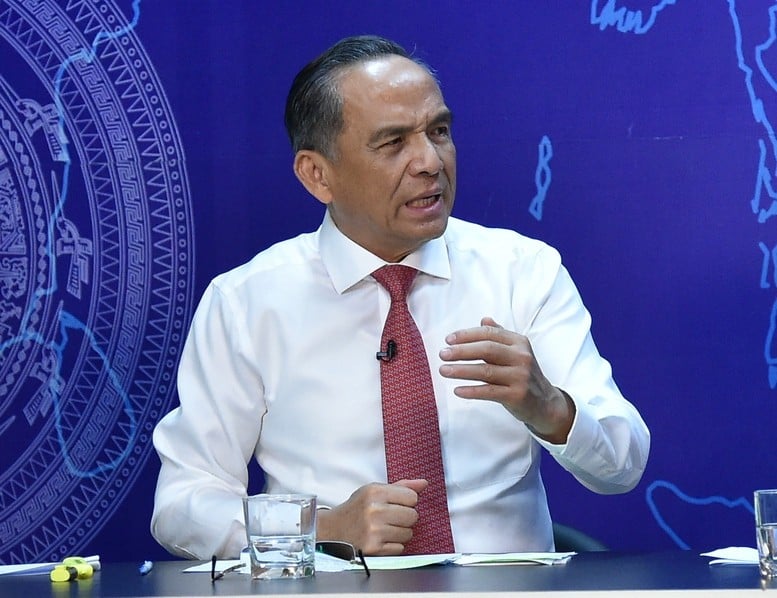
Dr. Nguyen Si Dung: To promote private economic development, many opinions say that it is necessary to focus more on improving management capacity along with implementing solutions to increase the reputation and access to credit resources of private enterprises. What is your opinion on this issue and can you analyze more clearly the issues that need to be focused on in implementing solutions to increase access to credit resources of private enterprises?
Mr. Le Hoang Chau: In 2018, the Ho Chi Minh City Real Estate Association recommended that businesses must ensure three safety factors: legal, financial-credit, and management (for businesses, each project, etc.). In business management, risk management is very important to us, but there are times when we cannot fully anticipate, specifically risks caused by COVID, geopolitical conflicts, etc.
For the real estate market in the past 3 years, there is a risk that the private bond market is broken. When the global supply chain is broken, when the economy is hit by external shocks, then the real estate market is broken in getting cash flow. Without cash flow, there is no liquidity, no obligation to pay interest, pay debts to banks, to bondholders, and cannot carry out their projects. That is what I mean by healthy businesses.
In addition, there are businesses that invest widely and have the intention of appropriating customers' capital, which is even worse. It can be said that the ability to manage a business in the past time is the key. Today, businesses that have overcome the storm in the past 3 years are gradually recovering and growing again. Those businesses are customers that credit institutions can trust because they have enough courage and experience...
Enterprise risk management must go hand in hand with digital transformation, scientific management from the planning stage to the project implementation stage, all must be fully implemented. Enterprise governance is the most important, at the same time building reputation and brand with the spirit of "say what you say, do what you say", with reasonable prices. Besides, enterprises always want to have a healthy investment and business environment.
On a macro level, we really look forward to having a strategy to build Vietnamese national enterprises, launching the "make in Vietnam" movement - production in Vietnam, moving towards "made in Vietnam" - copyrighted brands and initiatives of Vietnamese people.
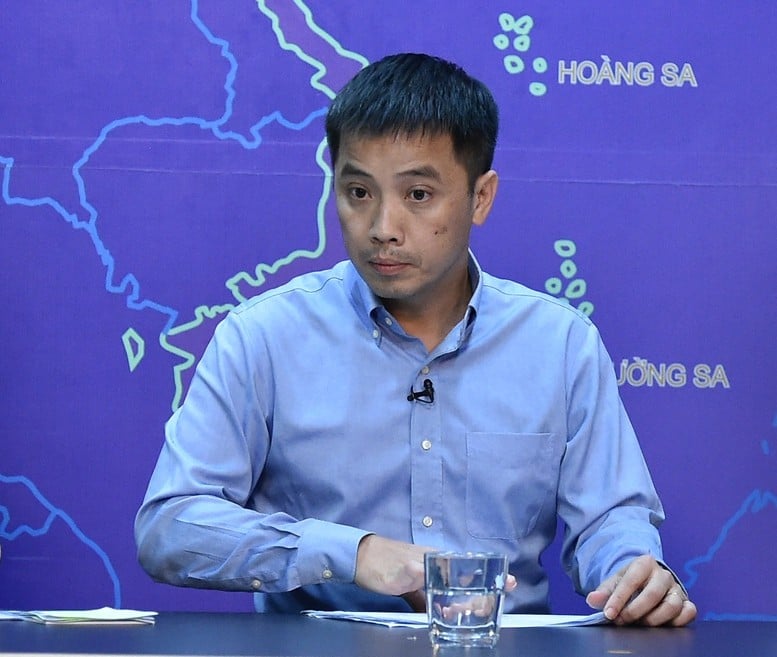
Dr. Nguyen Si Dung: Increasing resources for the private economic sector, including capital resources, must not be spread evenly, evenly and widely, but must have a focus, key points and be selective. From the banking perspective, in your opinion, which private enterprises should be prioritized for support?
Dr. Dau Anh Tuan: I strongly agree with Dr. Nguyen Si Dung's view that capital is limited, so we must direct capital to activities that create the most competitive advantages and the best social effects. I think that capital should be opened up and promoted, encouraged to flow into the production sector, where specific goods and services are created, where jobs are created for many workers, where many social security issues are solved. Therefore, the industries in which we have strengths, such as agriculture, are not only businesses but also many farmers.
One of the difficulties of commercial banks today is accessing and connecting with good businesses. Resolution 68 has partly provided a solution to this problem, such as requiring increased information connection between tax agencies, treasuries, law enforcement agencies and the banking system. Thereby, banks can access data on the legal compliance history of businesses. Instead of having to collect information themselves, wasting time and money, sharing and connecting data will give banks an advantage in evaluating and selecting potential customers.
Resolution 68 has encouraged lending not only based on collateral, but also on cash flow. However, to do this, it is necessary to remove barriers in the legal system. Currently, from decrees to circulars, there are still regulations that hinder commercial banks when applying cash flow lending. If we review and eliminate these inappropriate regulations, it will create conditions for credit activities to operate more safely and effectively.
It is also important to recognize that lending to cash flows always involves risks, and in the event of a risk occurring, the bank may be held accountable. Therefore, accepting risks in business operations is necessary, as long as those risks are well managed by removing unnecessary legal barriers. Instead of only lending to secured assets, banks should be given the opportunity to extend credit to businesses with good cash flows, a clear history of compliance with the law, and are assessed as having potential – even if they do not have collateral.
This is also a way to encourage creative startups, innovative businesses, and businesses without capital but with development prospects. Therefore, the role of the institutional system and fundamental legal regulations is extremely important.
Regarding the issue of investment funds in Vietnam, the reality shows that the number of venture capital funds in Vietnam is still relatively modest. There are many reasons for the limited investment capital in the domestic market, one of the important reasons being the regulations related to the stock exchange.
Specifically, the current regulations on conditions for enterprises to be listed on the Vietnamese stock exchange are very strict. Investment funds, when investing in enterprises, need a mechanism to withdraw capital and recover profits. However, in the context of the current IPO conditions requiring enterprises to be profitable for 2 consecutive years and have no accumulated losses, the ability of investors to divest capital is almost severely limited. Therefore, in the current Vietnamese stock market, the majority of listed enterprises are commercial banks and real estate enterprises; while innovative enterprises - despite their potential - very few enterprises meet the listing conditions.
Resolution 68 and Resolution 57 have initially cleared these bottlenecks. As far as I know, the Law on Science and Technology on Innovation also has provisions on the establishment of a separate listing floor for enterprises in the fields of science, technology and innovation. This is a very important direction to remove institutional difficulties, thereby paving the way for investment capital flows - especially venture capital - to access domestic innovative enterprises more effectively.
A very difficult point today is access to credit capital for small and medium enterprises (SMEs), especially small and micro enterprises - the sector that accounts for 97-98% of the total number of enterprises in Vietnam. This group of enterprises has almost no access to the formal banking system. They often have to borrow from informal sources such as relatives, friends, and even from "black credit", which poses many potential risks both financially and legally.
We now have support tools such as the SME Support Fund and the Credit Guarantee Fund. However, despite being formally established, these funds still operate ineffectively. Resolution 68 has proposed many solutions to operate these support and credit guarantee funds in a more efficient and market-oriented manner. Instead of operating as an administrative institution as before, the funds need to be organized in a more flexible manner, ready to accept controlled risks to support the right subjects and targets.
In fact, the solutions in Resolution 68 are aimed at creating capital sources for the private business sector, especially the manufacturing sector, SMEs and encouraged sectors such as green transformation. Along with that, Resolution 198 of the National Assembly also proposed specific solutions such as supporting 2% interest rates for businesses implementing green transformation - a very positive signal.
We believe that capital is a particularly important factor for economic development. Capital must be directed and directed to the right places – into production and innovation, not creating asset bubbles or speculation, which pose many risks to macroeconomic stability. The solutions that the Party, the National Assembly and the Government have been implementing in recent times are all aimed at removing difficulties and promoting healthy capital flows, thereby contributing to managing and orienting the development of the economy in a more sustainable manner.
Dr. Nguyen Si Dung: Mr. Tuan's ideas are very important, because we must direct capital to where it is needed, where competitiveness is created. At the same time, to our policy priorities. It is indeed a green economy, investing in science and technology to create breakthroughs. One idea that I think is very important is creating capital for SMEs, creating priority capital.
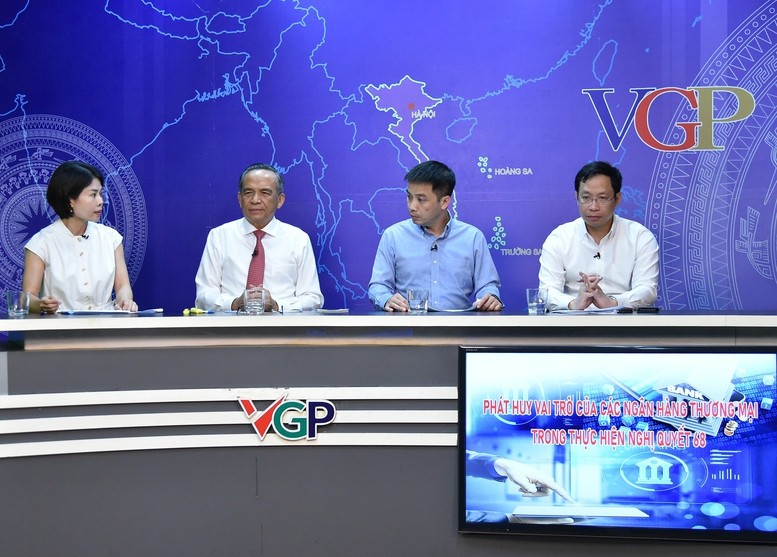
Dr. Nguyen Si Dung: VietinBank has been actively implementing the image of a dynamic, understanding, sympathetic and active VietinBank for businesses. At today's seminar, can you share the flexible and preferential policies that the bank will apply to support businesses in the coming time and how VietinBank wishes to coordinate and work together with other commercial banks in the system to jointly support the development of the private economic sector, effectively implementing Resolution 68 and related Resolutions of the Central Government, the National Assembly and the Government?
Ms. Nguyen Bao Thanh Van: Currently, VietinBank is shaping its development strategy to become a dynamic bank that understands and acts for customers. This is not just a slogan but a consistent goal throughout the entire development process of the bank. To realize this goal, we have implemented many specific and synchronous solutions.
Resolution 68 focuses strongly on the private sector and small and micro enterprises (SMEs). This is also the consistent guiding spirit of the State Bank, and VietinBank – as one of the key state-owned commercial banks – has seriously received and implemented it through the issuance of appropriate mechanisms and policies. In particular, we prioritize the allocation of the best resources, not only financial but also non-financial support, to accompany businesses on their development journey.
In addition, we also provide non-financial support and consulting services to businesses. For example, some small businesses - a group of customers who have difficulty accessing banking services and are unfamiliar with regulations on taxes, accounting or financial transparency. VietinBank supports this group in improving their financial capacity, improving financial reports to increase their chances of accessing preferential and higher-quality capital sources.
In addition, VietinBank also works directly with customers through the RM team at branches. We organize many business connection seminars in regions across the country, and at the same time increase communication on mass media so that any business in need can easily access VietinBank's information and services.
We look forward to the support and assistance of the State Bank. And the entire banking system will follow the spirit of Resolution 68 to develop healthily, towards achieving the Government's priority goals.
Another difficulty we are facing is that the banks themselves, including VietinBank, also need to adjust old regulations and legal mechanisms to better suit the characteristics of this new customer group.
In the risk management stage for SME customers, a new approach is also needed. And in the process of creating financial products and services for this group of customers, we want to listen more to practical feedback to make appropriate adjustments, ensuring that banking products are not only correct in theory but also truly accompany and support customers effectively.
Regarding the competitive environment, VietinBank always supports healthy competition - where banks accompany businesses based on sustainable values, dedicated services, flexible financial solutions and long-term commitment.
In addition, VietinBank expects the banking system to work towards a common vision, and commits to focusing resources on areas that the Government has clearly identified as priority areas such as green credit, manufacturing, and agriculture - industries that require large capital but have the potential to create high spillover value, contributing significantly to GDP growth and sustainable development.
We believe that if the entire banking system works together, complies with unified guidelines, promotes innovation, and serves customers proactively and responsibly, it will certainly contribute to promoting the development of the private economic sector - a key driving force for the country's common prosperity.

Dr. Nguyen Si Dung: One last question, I would like to ask Mr. Lan. Solutions to open the credit market, creating conditions for both banks and businesses, such as the credit guarantee fund, which has been in place but has had very low efficiency; or the credit rating system of businesses to help businesses, a series of other solutions to clear the way. Here, on the part of the State Bank as well as related parties, this is not only the State Bank's job - but as a representative of the management agencies, could you please share about those issues and additional solutions to implement, to support both commercial banks and businesses?
Mr. Nguyen Phi Lan: Resolution 68 has very detailed and specific solutions, including both short-term and long-term solutions, with very clear and specific assignments for ministries and branches.
And Resolution 198 of the National Assembly has further concretized, transferring solutions from Resolution 68 to Resolution 198. Next, to ensure the coordination mechanism, the Prime Minister has assigned and assigned tasks very clearly to ministries, branches and related units, immediately issuing Resolutions 138 and 139.
These resolutions have specifically assigned responsibilities to ministries and branches in the short and long term, on how to create conditions for the private economic sector to access capital and develop.
All of these solutions show that the Government and the Prime Minister have a very objective, comprehensive and comprehensive view of all the problems that the private economic sector is currently facing. The solutions have also been specifically assigned to the banking sector and other ministries and sectors.
For the banking industry, in the process of accompanying the private economic sector, we always attach importance to how to create the most open environment, helping private enterprises access capital sources. If in the past, many people thought that interest rates were still high, in fact, up to now, the interest rate level has dropped very low. We have returned to the interest rate level of the pre-COVID-19 period in 2019, even lower.
Thus, this is a great effort of the banking industry, because we know that after the COVID-19 pandemic, the world economy has many fluctuations, geopolitics changes frequently, and the interest rates of central banks of countries have increased very high. In that context, the State Bank of Vietnam has tried to stabilize interest rates, while supporting businesses to recover from the pandemic and recover from natural disasters by reducing interest rates so that they can access the best capital sources. That has created many favorable conditions for the private economic sector.
In addition, as mentioned, credit programs have been built. These programs create loan packages based on the needs and targets of each market segment, each different customer segment, so that customers can access them. These credit programs have different preferential interest rates, classified according to the right target. If you are a subject in need of incentives, you will have access to capital from programs set by the Government and banks.
This shows that the State Bank not only closely follows the directions of the Government and the Prime Minister but also concretizes Resolution 68 issued by the Politburo. This is one of the solutions showing that the State Bank is accompanying businesses.
Another issue raised is how, in addition to supporting businesses, we must create a healthy competitive environment. In Resolutions 138 and 139, the Prime Minister assigned the State Bank and ministries and branches to, in addition to creating access to capital for businesses, carry out inspection and examination activities on issues related to lending, to ensure that capital is used for the right purposes, for the right lending objectives, and to avoid the situation where money flows into risky areas, causing instability for the economy. In Resolutions 138 and 139, the Prime Minister assigned ministries and branches, including the State Bank, to implement this content. This is one of the solutions to ensure that businesses have access to capital while ensuring safety for the businesses themselves.
At the same time, it is also the concretization of programs, as well as the issue of information connection to ensure that banks and the State Bank's Information Portal will have information to provide to businesses and commercial banks in the process of accessing information, so that they can be connected. This is one of the goals that has been concretized in the two plans of the banking industry, a solution that shows that the banking industry is accompanying businesses.
Dr. Nguyen Si Dung: The Government Portal held a discussion that I think is very important to review Resolution 68. This is indeed a breakthrough in thinking and a breakthrough in doing, and very specific. After that, the resolution was concretized very quickly by the Government and the National Assembly. Never before has a policy been institutionalized so quickly. Today we have discussed in depth the role of commercial banks and the perspective of providing capital for the economy and for private enterprises.
Source: https://baolangson.vn/tong-thuat-toa-dam-phat-huy-vai-tro-cua-cac-ngan-hang-thuong-mai-trong-thuc-hien-nghi-quyet-68-5051399.html


































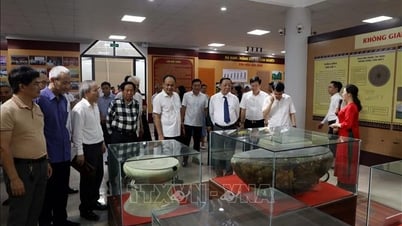





























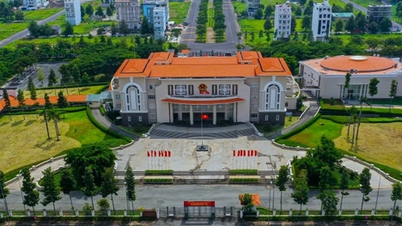





































Comment (0)